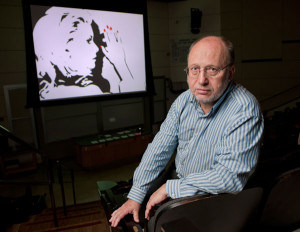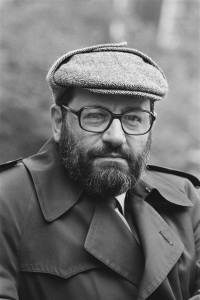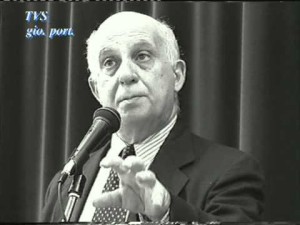
He remembers. (Photo: L.A. Cicero)
I didn’t know Umberto Eco, and I read Name of the Rose so many years ago that I had nothing to add to the news of his death on Feb. 19. One friend did, however: Stanford’s Jean-Marie Apostolidès posted his memories of the great Italian author in a short Facebook post. With his permission, I repost a translation of his single encounter with the maestro:
Remembrances of an intimate dinner party in Cambridge, Massachusetts, in 1984 (if memory serves me). Those present included the great American logician Willard Quine; Umberto Eco, wreathed in the glory of his novel The Name of the Rose, which had just appeared in English; and yours truly, the youngest of the table.

Maestro (Photo: Rob Bogaerts, Creative Commons)
All three of us were invited by Dante Della Terza, who taught Italian literature at Harvard for many years. Dante and Umberto had known each other for ages, hence the casual nature of the dinner. Dante’s wife had concocted her best Italian specialties, accompanied by a Montepulciano wine, which I will say more about. This friendly communion allowed us to reconstruct the world on a new basis, no doubt we were a little shameless.The four men were, after dining, a little tipsy, treated like pashas by the only woman in attendance that evening. Dante’s wife had indeed spent most of her time at the stove, and I do not believe in our project, changing the status of women had been on our agenda: we were too happy with the situation as it was!
To give our drinking a little intellectual cast, I proposed to my comrades that we compile a list of the ten most important philosophers in the history of thought, those that allowed us to make today’s world a little better. Each had to list their personal choices before we arrived at a common list. Mrs. Della Terza passed pen and paper to each of us. A silence of three or four minutes fell upon the table, despite the grappa that crowned the feast and redoubled our jokes. And then each in turn read his list.

The host for the evening
But when the time came to make the collective list, we were unable to come to agreement, our choices so diverged. Umberto and I had quite a few names in common (Aristotle among the ancients, among modern Nietzsche) but Quine – who had the most clout as an authority in philosophy – brutally rejected all our proposals. A reserved man when sober, the wine had worked wickedly on him. When I advanced the name of Marx, he had a sarcastic smile, then said dismissively: “For me, he’s not even a philosopher.”
When Quine had asked Umberto to read us his own personal list, I discovered the logical basis for my ignorance: with the exception of Henri Poincaré, I did not know any of the thinkers he considered essential for the future of thought.

The great logician
In short, our attempt to improve the world failed miserably. Yet were we not, all four of us, great enlightened ones? This failure did not prevent us from finishing off the evening in good spirits and, with the help of the grappa, we were all perfectly happy and pleased with ourselves when leaving the Della Terza home.
Today when I think back to that memorable evening, I regret not having taken note of names we had chosen. I particularly regret that we, the sage ones, could not come to agreement. If we had, might today’s world be in better shape?
Tags: "Jean-Marie Apostolidès", Aristotle, Dante Della Terza, Friedrich Nietzsche, Henri Poincaré, Umberto Eco, Willard Quine


March 8th, 2016 at 5:45 pm
A very fine appreciation. Thank you, as always. Incidentally, the Frankfurter Allgemeine Zeitung had a short reminiscence of Eco the other day by Orhan Pamuk. The last paragraph of that story was very nice: “One day, as he was visiting me in my study, he sat opposite me in a large easy chair. And as I recounted to him how I got that chair from my father and often remember how my father would sit in that chair when I was a child, Umberto nodded and said that he was exactly as old as my dad. I believe that he wanted to imply that in a certain way he was like a father for me. And he was right: Umberto Eco, from whom I have learned so much, was an intellectual father figure for me. I am very sad.”
http://www.faz.net/aktuell/feuilleton/buecher/autoren/zum-tod-von-italienischen-schriftsteller-umberto-eco-14082704.html
March 8th, 2016 at 6:21 pm
Thank you for this, Stephen! What a lovely anecdote!